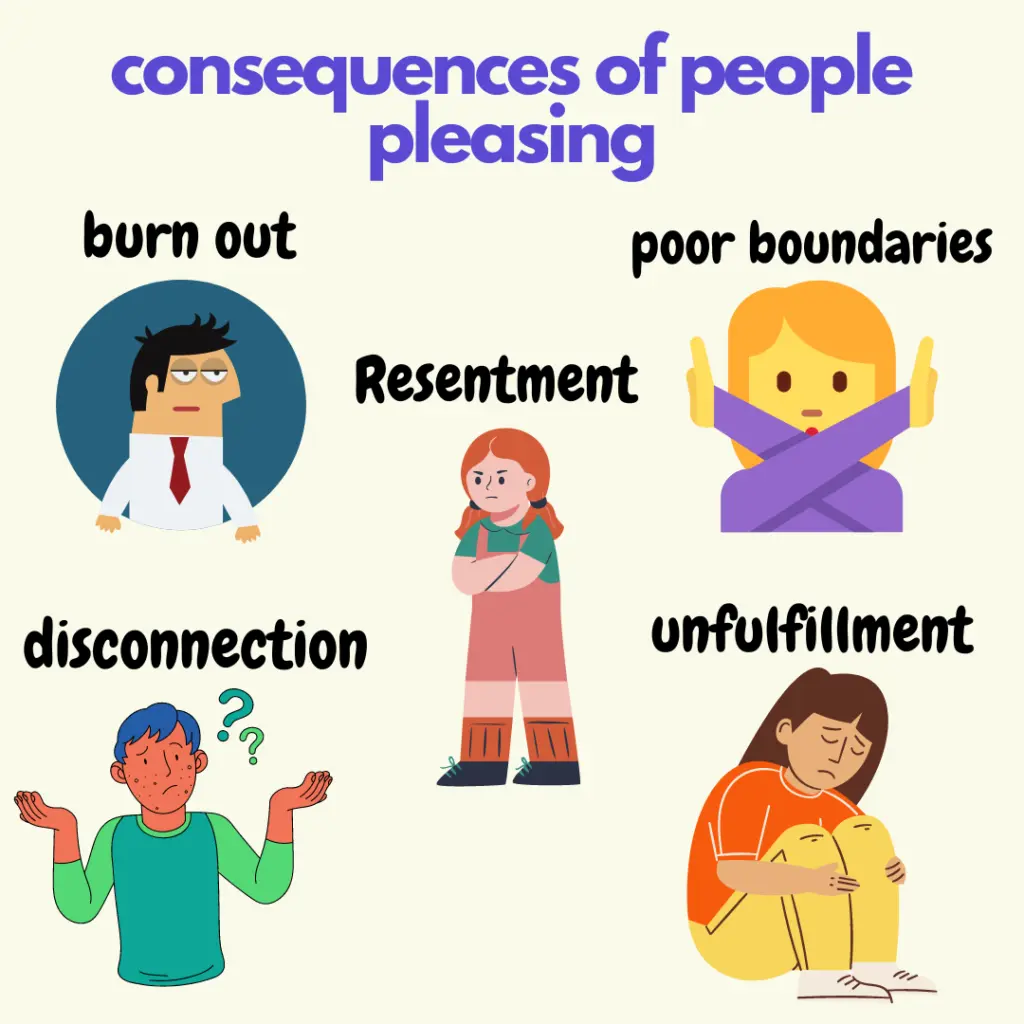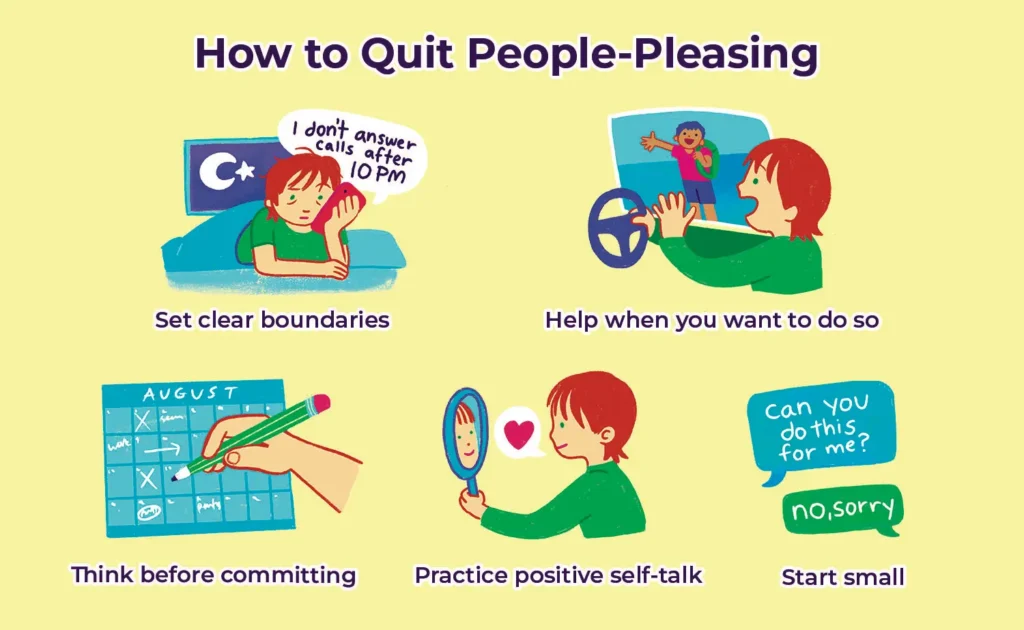In this article, we’ll explore the ins and outs of people-pleasing behavior and provide practical strategies on “How to Stop Being a People-Pleaser in Relationships.”
Are you the one trying to please everyone? Do you always say “yes” when you want to say “no”?
Do you always prioritize others’ needs over your own, even if it means risking your health?
While it’s noble to want to make everyone happy, it’s crucial not to forget about your own needs and limits. Remember, self-care is not selfish.
It’s a necessary step towards maintaining your own health and happiness.
According to Heartmanity’s Blog; The cost of being a people pleaser is higher than most realize and cripples relationships. Learn to be true to yourself and let go of fear and resentment.
I was also one of those guys who always thought about others first and tried to please everyone, but after a long experience, I stopped pleasing people.
I have written this guide after deep research and my own experience.
Welcome to this blog post on How to Stop Being a People-Pleaser in Relationships. In this post, we will learn why breaking out of this pattern is essential, especially regarding relationships.
This piece goes into great detail about people-pleasing behavior, including where it comes from, what it does, and most importantly, how you can take back control and make better connections.
Keep reading if you want to stop always saying “yes” and start putting your own happiness first.
What Is a People-Pleaser?

A people-pleaser is someone who prioritizes the needs and desires of others over their own, often at the expense of their own well-being.
They have a deep-seated fear of disappointing or upsetting others, leading them to seek approval and validation from those around them constantly.
People-pleasers have a tendency to say “yes” to requests, even when it inconveniences them or goes against their own desires.
They may avoid conflict at all costs and go to great lengths to avoid disappointing others, often sacrificing their own happiness and authenticity in the process.
This pattern of behavior can be deeply ingrained and can manifest in various aspects of their lives, particularly in their relationships.
Is there a People Pleaser Personality?
Although there isn’t a single personality type called a “people-pleaser,” there are traits and behaviors that are often linked to this pattern.
People who are very polite, empathetic, and want to keep things peaceful in their relationships are more likely to fall into the people-pleasing trap.
They often prioritize keeping the peace and avoiding strife, even if it means giving up their own wants and needs.
People who have experienced trauma or who grew up in places where their worth depended on how well they could please others may also be more likely to develop people-pleasing habits.
That being said, it’s important to remember that people-pleasing behavior isn’t just based on mental traits; it can be stronger or less strong depending on the person.
Recognizing People-Pleasing Behaviour
You can easily spot people-pleasing behavior by noticing the different traits and patterns that people use in their relationships and exchanges.
To begin, people who have this disorder naturally have trouble saying “no,” which can lead to overcommitment and tiredness as they put the needs of others ahead of their own.
To add to that, people-pleasers often depend on the approval and support of those around them to feel good about themselves, rather than their own sense of worth.
People-pleasers also have a deep-seated fear of conflict, which makes them avoid it at all costs, even if it means hiding their own thoughts and feelings.
These habits often have emotional and mental effects, such as increased stress and anxiety, and feelings of anger or not being good enough.
Learning and recognizing these traits of people-pleasers can help people become more assertive and speak up for themselves in their relationships.
Identifying the Root Causes
- Childhood Influences and Upbringing: Environments where worth is tied to meeting others’ expectations, can lead to ingrained people-pleasing behaviors.
- Cultural and Societal Expectations: Societal norms often reinforce pressure to prioritize others’ needs over one’s own, promoting the belief that people-pleasing is virtuous.
- Personal Insecurities and Low Self-Esteem: Individuals may use people-pleasing to compensate for inadequacy, seeking external validation to bolster their self-worth.
- The Need for Validation and Approval: A constant desire for validation and approval drives people-pleasers to prioritize others’ opinions and desires above their own, perpetuating the cycle of seeking external validation.
Effects of Being a People-Pleaser

- Personal Well-Being: Constant prioritization of others’ needs leads to exhaustion, burnout, and neglect of self-care.
- Impact on Relationship Dynamics: This creates an imbalance of power, where the people-pleaser feels subordinate and unable to assert their own needs and boundaries.
- Resentment and Frustration: Suppressed resentment and frustration can build over time, eroding trust and intimacy in relationships.
- Long-Term Emotional and Mental Health Risks: Chronic people-pleasing is associated with increased stress, anxiety, depression, and a diminished sense of self-worth, posing risks to long-term emotional and mental well-being.
Strategies for How to Stop Being a People-Pleaser in Relationships

Breaking free from the cycle of people-pleasing requires a multifaceted approach that encompasses building self-awareness, developing assertiveness skills, setting healthy boundaries, enhancing self-esteem and confidence, and seeking professional help when needed.
Building Self-Awareness
Reflective Journaling: Keep a journal to reflect on your thoughts, feelings, and behaviors in various situations. Identify patterns of people-pleasing and explore the underlying motivations behind them.
Identifying Triggers: Pay attention to situations or interactions that trigger your people-pleasing tendencies. Understanding these triggers can help you anticipate and manage them more effectively.
Developing Assertiveness Skills
Understanding Assertiveness: Educate yourself on what assertiveness truly means. Recognize that being assertive involves expressing your needs and opinions confidently and respectfully, without disregarding the needs of others.
Practicing Assertive Communication: Practice assertive communication techniques such as using “I” statements, expressing your thoughts and feelings clearly, and standing firm on your boundaries without aggression or passive-aggressiveness.
Setting Healthy Boundaries
Importance of Boundaries: Understand that setting and maintaining healthy boundaries is essential for preserving your well-being and fostering healthy relationships. Boundaries define acceptable behavior and protect your physical, emotional, and mental space.
Steps to Establish and Maintain Boundaries: Clearly communicate your boundaries to others, assertively enforce them when necessary, and be prepared to respect others’ boundaries in return. Consistency is key to maintaining boundaries effectively.
Enhancing Self-Esteem and Confidence
Positive Affirmations: Practice affirming yourself with positive statements that reinforce your self-worth and capabilities. Challenge negative self-talk and replace it with affirmations that build self-esteem and confidence.
Setting and Achieving Personal Goals: Set realistic and achievable goals for yourself, both short-term and long-term. Celebrate your successes along the way and use them to boost your confidence and self-esteem.
Seeking Professional Help
Therapy and Counseling: Consider seeking support from a therapist or counselor who can help you explore deeper issues contributing to your people-pleasing behavior. Therapy can provide valuable insights and tools for overcoming ingrained patterns.
Support Groups and Workshops: Joining support groups or attending workshops focused on assertiveness, boundary-setting, and self-esteem can provide additional resources and a supportive community of individuals striving toward similar goals.
Sustaining Long-Term Change
Achieving freedom from people-pleasing behaviors is a significant accomplishment, but sustaining long-term change requires ongoing effort and commitment. Here are some strategies to help you maintain your progress and continue thriving in assertive, fulfilling relationships:
Maintaining Consistency in Behavior: Consistency is key to solidifying new habits and behaviors. Continue practicing assertiveness and boundary-setting consistently in your interactions with others, even when faced with challenges or temptations to revert to people-pleasing tendencies.
Regularly Reassessing and Adjusting Boundaries: As your relationships and circumstances evolve, it’s important to reassess and adjust your boundaries accordingly.
Regularly evaluate whether your boundaries are still serving you well and make necessary adjustments to ensure they align with your needs and values.
Celebrating Progress and Milestones: Acknowledge and celebrate the progress you’ve made along your journey to assertiveness.
Whether it’s reaching a personal goal, successfully asserting yourself in a challenging situation, or maintaining healthy boundaries, take time to celebrate your achievements and recognize how far you’ve come.
Avoiding Relapse into People-Pleasing: Be vigilant against the temptation to fall back into old patterns of people-pleasing.
Stay mindful of your triggers and warning signs, and have strategies in place to cope with challenging situations without resorting to people-pleasing behaviors. Surround yourself with supportive individuals who encourage and reinforce your assertiveness and self-worth.
By maintaining consistency in your behavior, regularly reassessing and adjusting your boundaries, celebrating your progress, and staying vigilant against relapse, you can sustain long-term change and cultivate healthier, more authentic relationships built on mutual respect and empowerment.
- Also Read This Article: Unlocking the Secrets: Decoding Mike Mentzer’s Workout Routine and Diet Plan
Conclusion: How to Stop Being a People-Pleaser in Relationships
In this discussion about how to be more assertive and how to stop being a people-pleaser in relationships, we’ve learned a lot about the traits, behaviors, and causes of people-pleasing.
We’ve talked about how this pattern can hurt your health and relationships, and we’ve given you exercises and methods you can use to break free of it.
Each step, from becoming more self-aware and learning how to be assertive to setting healthy limits and getting professional help when you need it, shows that you are dedicated to your own growth and empowerment.
Remember that making changes that last takes consistency, self-reflection, and being ready to celebrate progress while also being on the lookout for relapse.
Before you start this journey, remember that the first step to better relationships is to respect your own wants and limits.
Be bold and true to yourself, stop trying to please everyone, and your relationships will grow as people respect and understand each other.
If you found this post informative, please leave a comment below saying, “I found this post informative.”
Additionally, we encourage you to share this post with others to help educate more people.
Also, don’t forget to subscribe to our email newsletter to receive more informative content like this directly in your inbox.
FAQs: How to Stop Being a People-Pleaser in Relationships
What are the signs that I am a people-pleaser?
Signs that you’re a people-pleaser include difficulty saying no, seeking constant approval, and avoiding conflict at all costs.
How can I start setting boundaries without feeling guilty?
Start setting boundaries without guilt by recognizing your worth and prioritizing your needs. Communicate assertively and remind yourself that boundaries are essential for self-care and healthy relationships.
What if my partner doesn’t support my efforts to change?
If your partner doesn’t support your efforts to change, express your feelings openly and assertively. Seek couples therapy to address relationship dynamics and find mutual understanding.
Can people-pleasing ever be beneficial in relationships?
While people-pleasing may seem beneficial in the short term, it often leads to resentment and imbalance in relationships. Authenticity and assertiveness foster healthier connections in the long run.
How long does it take to stop being a people-pleaser?
The time it takes to stop being a people-pleaser varies for each individual. It involves self-awareness, practice, and patience. Celebrate small victories along the way and seek support when needed.
How do I stop being such a people pleaser?
Stop being a people-pleaser by setting clear boundaries, practicing self-care, and challenging limiting beliefs about self-worth and validation.
How to deal with people pleasers in relationships?
Deal with people-pleasers in relationships by encouraging open communication, setting mutual boundaries, and fostering an environment of acceptance and understanding.
What is the root cause of people pleasing?
The root cause of people-pleasing often stems from childhood experiences, societal expectations, and low self-esteem. Addressing these underlying factors is key to breaking the pattern.
What is the best therapy for people pleasing?
Cognitive-behavioral therapy (CBT) and dialectical behavior therapy (DBT) are effective therapies for addressing people-pleasing behaviors. These therapies help challenge distorted thinking patterns and develop healthy coping strategies.
How to stop people pleasing your partner?
Stop people-pleasing your partner by prioritizing your needs, communicating openly, and seeking support from a therapist or counselor to address codependent relationship dynamics.
Is people pleasing a form of OCD?
People-pleasing shares similarities with obsessive-compulsive traits, but it’s not considered a form of OCD. It’s more closely linked to social anxiety and low self-esteem.